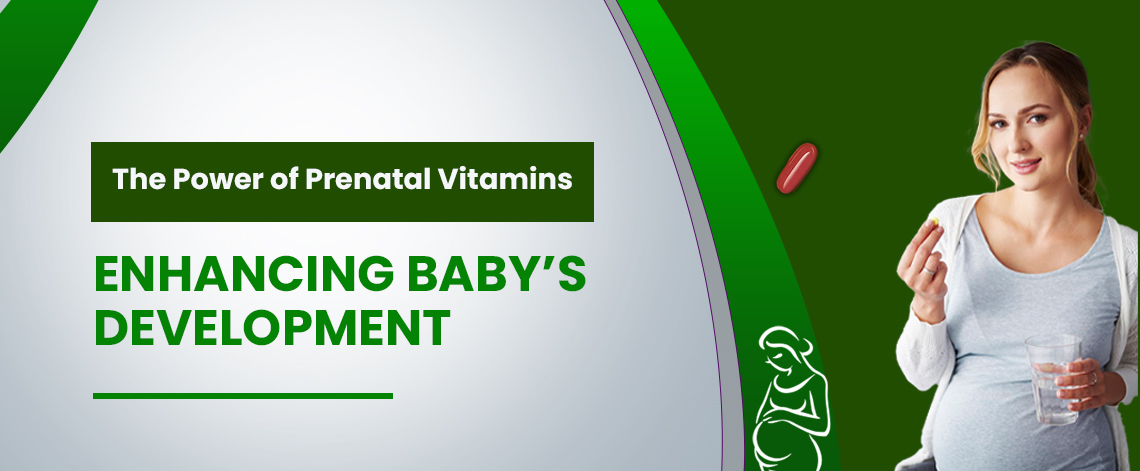
The Power of Prenatal Vitamins: Supporting Your Baby’s Development
In the United States, about four percent of pregnancies are unplanned. This means that many women find out they are pregnant before they can start taking prenatal vitamins. But it also means that many women who do begin taking prenatal vitamins in their first month of pregnancy—or even earlier—may not have learned all there is to know about these supplements. Prenatal multivitamins contain nutrients your growing baby needs during this critical time, and understanding how they work together can help you make the best choice for your own nutritional health during this exciting yet challenging time.
Understanding Your Prenatal Multivitamin
When you’re pregnant, getting the necessary nutrients for your baby’s development is important. Prenatal vitamins provide those nutrients in an easy-to-take form.
There are two main types of prenatal vitamins: pills and gummies. Pills can be taken with food or on an empty stomach, but some people find them hard to swallow. Gummies are easier to take because they taste like candy and don’t have any unpleasant side effects like nausea or constipation that some women experience when taking pills daily over long periods of time (like during pregnancy).
Folic acid is a B vitamin essential for developing a baby’s brain and spinal cord. It also helps prevent birth defects in the baby’s brain and spine.
Folic acid is especially important for women who are pregnant or planning to become pregnant, but it’s also beneficial for anyone who needs an energy boost (which can be anyone!).
How to Choose the Right Prenatal Multivitamin?
When it comes to choosing the right prenatal multivitamin, there are a few things you want to look out for and it is important just like when you choose any skin treatment according to your skin type. First and foremost, make sure that your prenatal vitamin contains at least 400 micrograms of folic acid. This helps prevent neural tube defects in your baby’s brain and spinal cord (spina bifida) by helping cells divide properly during pregnancy.
Next, look at the amount of iron in each serving–you should aim for 10 milligrams per day or more if you’re pregnant with twins or triplets (or if you have a history of blood loss during childbirth). Iron helps build red blood cells that carry oxygen throughout your body; having enough iron will help keep both mommy and baby healthy!
Finally, make sure that any prenatal vitamins also contain 1 gram of calcium per day–this mineral is crucial for building strong bones during pregnancy as well as breast milk production after birth!
When to Start Taking Prenatal Vitamins?
Prenatal vitamins are safe for pregnant women to take. As with any medication, it’s best to talk to your doctor about the right time to start taking prenatal vitamins. In general, though, you should begin taking prenatal vitamins as soon as you know that you are pregnant or even before pregnancy occurs if possible (if this is possible).
Prenatal vitamins should be taken every day for them to work properly in supporting fetal development. Ideally, these should be taken with food because this helps them go down easier and makes them more effective overall–but if there’s no way around it, then taking them on an empty stomach is still fine too!
Vitamin D
Vitamin D is a fat-soluble vitamin that plays an important role in calcium absorption. It’s also essential for healthy bones and teeth, as well as the immune system.
Vitamin D is made when the skin is exposed to sunlight, but many people don’t get enough sun exposure–especially those who live in northern climates or spend most of their time indoors. The best food sources of vitamin D include fatty fish like salmon, eggs, and dairy products (such as cheese).
Iron
Iron is a mineral that helps your body produce red blood cells and carry oxygen to the rest of your body. This can be especially important for pregnant women, who need extra iron because their bodies are working hard to grow a baby.
The recommended daily intake of iron during pregnancy is 27 milligrams per day (mg/day). Most prenatal vitamins contain about 18 mg/day, so if you’re taking one without additional supplements you may need to eat more foods with iron in them or take an additional supplement (like ferrous sulfate) on top of what you’re getting from your prenatal vitamin. The best sources of non-heme (plant) iron include:
Calcium and Phosphorus
Calcium and phosphorus are two minerals that your body needs to make bones, teeth, and other tissues. Calcium also helps to maintain muscle contraction (the movement of muscles) and nerve function. Phosphorus helps to maintain the body’s acid-base balance–that is, it keeps the pH level of your blood in check.
Calcium and phosphorus are important for everyone: children, as well as adults, need them for healthy growth and development; however, depending on your age or gender, you may need more than others do. For example:
- Adults aged 19-50 should aim for 1000 mg/day of calcium from food sources like dairy products or fortified foods like orange juice; this amount increases with age up until about 70 years old when people tend not to absorb as much calcium from food anymore because their digestive systems become less efficient over time due to aging effects on their bodies’ cells
Pregnant women need to take prenatal vitamins to support the development of their babies.
Prenatal vitamins are an important part of pregnancy. They can help your baby develop their brain, eyes, heart, and lungs. Prenatal vitamins also help with the development of bones and teeth.
If you are pregnant or planning on getting pregnant soon you must take prenatal vitamins every day so that your body can get the nutrients it needs from them for you and your baby!
It’s important to select a prenatal multivitamin that fits your individual needs.
When choosing a prenatal multivitamin, it’s important to select one that fits your individual needs. Here are some things to consider:
- Find a prenatal vitamin that contains the nutrients you want. You can find this out by looking at the label on the bottle or box of vitamins and reading what contains each ingredient.
- Find out how much of each nutrient is included in each serving size of your chosen brand of prenatal multivitamins. For example, if you have anemia and choose an iron-rich supplement that provides 18 mg per dose (the recommended daily requirement), but only takes 1/2 tablet each day instead of the full 2 tablets per day–you will not be getting enough iron! This could lead to serious complications for both mother and baby so make sure not only does it contain everything necessary but also enough quantity too!
- Make sure it’s easy for YOU personally to take them every day without fail because missing even just one dose could cause problems later down the line during pregnancy or labor/delivery period when blood volume levels drop off drastically due to delivery needs being higher than normal levels already exist before the pregnancy stage itself.
Conclusion
If you’re pregnant, it’s important to take a prenatal multivitamin. These vitamins provide the essential nutrients your body needs during this time and support the development of your baby. In our article, we’ve covered everything from what makes up a good prenatal vitamin to when you should start taking them. We hope that this information helps make your shopping experience easier so that you can find the right supplement for yourself!


You May Also Like

Why Should I Take Care of My Diet as a Mother?
November 16, 2022
Pregnancy Yoga: The Mainstay of Pregnancy Period
September 12, 2019

One Comment
T. H. Arabi
Thanks for sharing this valuable information about prenatal vitamins. Can you recommend a trusted brand?